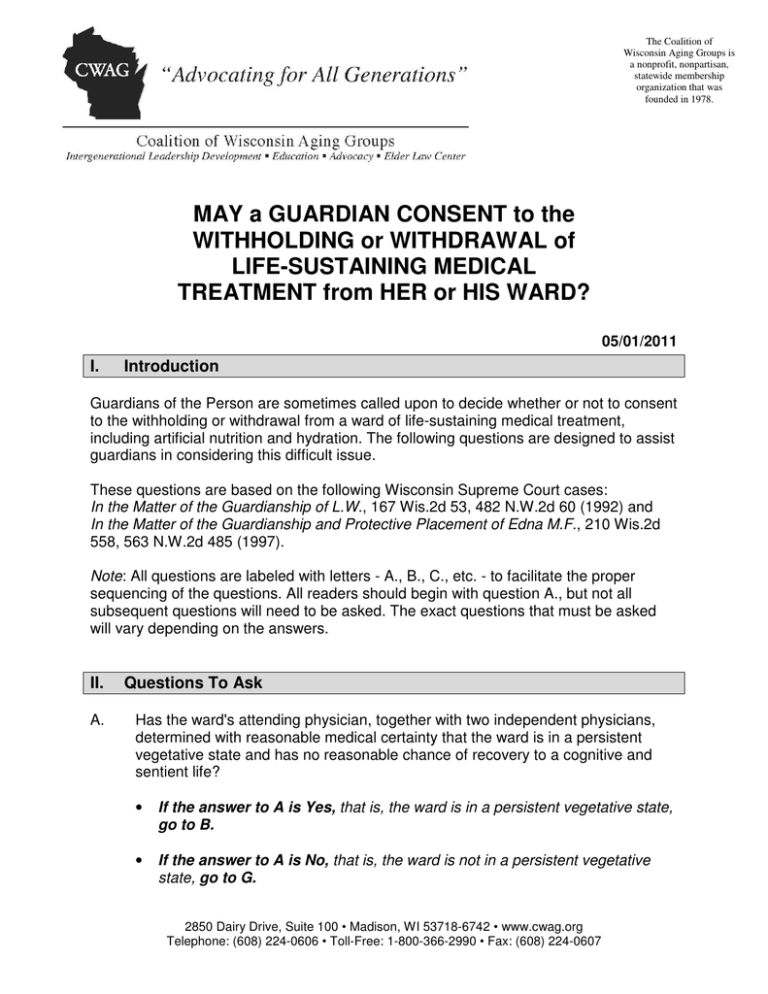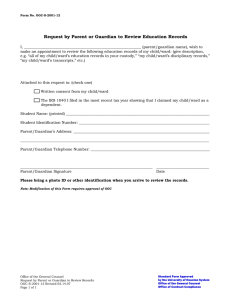
The Coalition of
Wisconsin Aging Groups is
a nonprofit, nonpartisan,
statewide membership
organization that was
founded in 1978.
MAY a GUARDIAN CONSENT to the
WITHHOLDING or WITHDRAWAL of
LIFE-SUSTAINING MEDICAL
TREATMENT from HER or HIS WARD?
05/01/2011
I.
Introduction
Guardians of the Person are sometimes called upon to decide whether or not to consent
to the withholding or withdrawal from a ward of life-sustaining medical treatment,
including artificial nutrition and hydration. The following questions are designed to assist
guardians in considering this difficult issue.
These questions are based on the following Wisconsin Supreme Court cases:
In the Matter of the Guardianship of L.W., 167 Wis.2d 53, 482 N.W.2d 60 (1992) and
In the Matter of the Guardianship and Protective Placement of Edna M.F., 210 Wis.2d
558, 563 N.W.2d 485 (1997).
Note: All questions are labeled with letters - A., B., C., etc. - to facilitate the proper
sequencing of the questions. All readers should begin with question A., but not all
subsequent questions will need to be asked. The exact questions that must be asked
will vary depending on the answers.
II.
A.
Questions To Ask
Has the ward's attending physician, together with two independent physicians,
determined with reasonable medical certainty that the ward is in a persistent
vegetative state and has no reasonable chance of recovery to a cognitive and
sentient life?
•
If the answer to A is Yes, that is, the ward is in a persistent vegetative state,
go to B.
•
If the answer to A is No, that is, the ward is not in a persistent vegetative
state, go to G.
2850 Dairy Drive, Suite 100 • Madison, WI 53718-6742 • www.cwag.org
Telephone: (608) 224-0606 • Toll-Free: 1-800-366-2990 • Fax: (608) 224-0607
B.
If the ward is in a persistent vegetative state, did the ward prior to incompetency
make a clear statement of his or her wishes1, either to withhold or withdraw lifesustaining medical treatment, or not to withhold or withdraw life-sustaining
medical treatment?
•
If the answer to B is Yes, that is, the ward prior to incompetency made a
clear statement of his or her wishes, go to C.
•
If the answer to B is No, that is, the ward prior to incompetency did not
make a clear statement of his or her wishes, go to D.
C.
If the ward made a clear statement prior to incompetency, the guardian must follow
the wishes of the ward.
D.
If the ward did not make a clear statement prior to incompetency, is withholding or
withdrawing life-sustaining medical treatment in the ward's best interests?
To answer this question, the guardian must begin with the presumption that
continued life is in the best interests of the ward. This presumption can be
overcome by a good faith consideration of the following factors from the standpoint
of the patient, not from the guardian’s own view of the quality of life of the ward:
E.
1.
The degree of humiliation, dependence, and loss of dignity probably resulting
from the condition and treatment;
2.
The life expectancy and prognosis for recovery with and without treatment;
3.
The various treatment options;
4.
The risks, side effects, and benefits of each of those options;
5.
The opinion of an ethics committee, if one is available at the facility where the
ward is receiving medical care;
6.
The opinions of a spouse, next of kin or close friend or associate over a
significant period of time.
•
If the answer to D is Yes, that is, withholding or withdrawing life-sustaining
medical treatment is in the ward's best interests, go to E.
•
If the answer to D is No, that is, withholding or withdrawing life-sustaining
medical treatment is not in the ward's best interests, go to F.
If withholding or withdrawing treatment is in the best interests of the ward, the
guardian may withdraw or withhold life-sustaining medical treatment but only after:
Giving notice of the decision to withhold or withdraw life-sustaining medical
treatment to any "interested party."2 Formal notice is not required, but the notice
must inform the interested parties of the decision and allow adequate time for
parties to respond.
2850 Dairy Drive, Suite 100 • Madison, WI 53718-6742 • www.cwag.org
Telephone: (608) 224-0606 • Toll-Free: 1-800-366-2990 • Fax: (608) 224-0607
If no interested party objects, the guardian may make the decision without court
approval.
If an interested party objects, the court will review the guardian’s decision. The
court will presume that continued life is in the best interests of the war. The burden
will rest on the guardian to show both the existence of a persistent vegetative state
to a high degree of medical certainty and that the decision to withhold or withdraw
treatment is in the ward's best interests and is being made in good faith.
F.
If withholding or withdrawing treatment is not in the ward’s best interests, the
guardian may not authorize the withholding or withdrawal of life-sustaining medical
treatment.
G.
If the ward is not in a persistent vegetative state, did the ward ever have a period
during which she or he was competent?
•
If the answer to G is Yes, that is, the ward had a period during which she or he
was competent, go to H.
•
If the answer to G is No, that is, the ward did not have a period during which
she or he was competent, go to K.
H.
If the ward was at one time competent, did the ward prior to incompetency3 make a
clear statement of his or her wishes4, either to withhold or withdraw life-sustaining
medical
treatment, or not to withhold or withdraw life-sustaining medical treatment?
•
If the answer to H is Yes, that is, the ward prior to incompetency made a clear
statement of his or her wishes, go to I.
•
If the answer to H is No, that is, the ward prior to incompetency did not make a
clear statement of his or her wishes, go to J.
I.
If the ward did make a clear statement, the guardian must follow the wishes of the
ward.5
J.
If the ward did not make a clear statement, the guardian may not authorize the
withholding or withdrawal of life-sustaining medical treatment.6
K.
If the ward was never competent, the guardian may not authorize the withholding
or withdrawal of life-sustaining medical treatment.7
1
The Court indicated that the ward’s wishes could be expressed in an advance
directive such as a Living Will or a Power of Attorney for Health Care or an oral
communication by the ward to another person. The Court did not further clarify what a
“statement” was. Other than to state that the ward’s wishes must be demonstrated by a
preponderance of the evidence, the Court did not state how specific the advance
directive or oral communication needed to be in order to be considered “clear.”
2850 Dairy Drive, Suite 100 • Madison, WI 53718-6742 • www.cwag.org
Telephone: (608) 224-0606 • Toll-Free: 1-800-366-2990 • Fax: (608) 224-0607
If the guardian is not aware of any statement of wishes made prior to incompetency,
the guardian will need to question the ward’s family and friends and any others who
might have evidence of the ward’s wishes.
2
“Interested parties“ include the ward; the ward's spouse; next of kin; close friend or
associate over a significant period of time; the ward's physician and the facility/agency
where the individual is receiving his or her medical care; the individual's guardian ad
litem, if any; an agent under a health care power of attorney; and any official or
representative of a public or private agency, corporation or association concerned with
the ward's welfare.
3
If the ward did not make a clear statement prior to incompetency but is expressing his
or her wishes about the withholding or withdrawing of life-sustaining medical treatment
while incompetent, consideration should be given to having a medical evaluation
conducted to determine if the ward is competent to make this decision and, if so, asking
the court to declare the ward competent for this purpose.
4
See footnote 1.
5
The Court did not set forth any procedure for the guardian to follow when she or he
decides to withhold or withdraw life-sustaining treatment based on the ward's wishes
when the ward is not in a persistent vegetative state. We recommend that the guardian
provide notice to interested persons as noted in the above section about persistent
vegetative state. Any interested party should be given an opportunity to seek a court
decision regarding the proposed withdrawal or withholding of treatment.
6
The “best interest” analysis that is used when a ward is in a persistent vegetative state
but did not make a clear statement of his or her wishes prior to incompetency, is not
allowed when the ward is not in a persistent vegetative state.
7
See footnote 6.
QUESTIONS? Call the Guardianship Support Center at 1-800-488-2596 ext. 314. Or e-mail
at guardian@cwag.org.
Reproduction of this brochure is permitted and encouraged, so long as no
modifications are made and credit to the author, the Wisconsin Guardianship
Support Center of the Coalition of Wisconsin Aging Groups, is retained.
This publication is provided for educational purposes only.
The information contained herein is not intended, and should not be used, as
legal advice. Application of the law depends upon individual facts and
circumstances. In addition, statutes, regulations and case law are subject to
change without notice. Consult a legal professional for assistance with individual
legal issues.
© 2011 Coalition of Wisconsin Aging Groups. All Rights Reserved.
2850 Dairy Drive, Suite 100 • Madison, WI 53718-6742 • www.cwag.org
Telephone: (608) 224-0606 • Toll-Free: 1-800-366-2990 • Fax: (608) 224-0607



